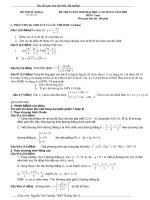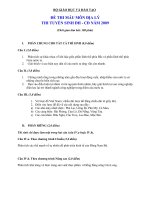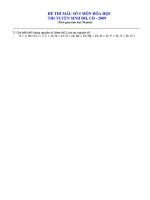Thi thử ĐH (bài 12) theo mẫu bộ GD - hot
Bạn đang xem bản rút gọn của tài liệu. Xem và tải ngay bản đầy đủ của tài liệu tại đây (217.28 KB, 10 trang )
ĐỀ THI MẪU MÔN TIẾNG ANH
THI TUYỂN SINH ĐH, CĐ 2009
(Thời gian làm bài: 90 phút)
Mark the letter A, B, C or D on your answer sheet to indicate the word that differs from the
rest in the position of the main stress in each of the following questions.
Question 1: A. enterprise B. prevention
C. fertilize D. implement
Question 2: A. accompany B. comfortable
C. interview D. dynamism
Question 3: A. effectiveness B. satisfaction
C. accountancy D. appropriate
Question 4: A. secure B. oblige
C. vacant D. equip
Question 5: A. representative B. characteristic
C. technological D. punctuality
Mark the letter A, B, C or D on your answer sheet to indicate the correct answer to each of
the following questions.
Question 6: She on her computer for more than two hours when she decided to stop for a
rest.
A. has worked B. has been working
C. was working D. had been working
Question 7: It’s nice I am now in London again. This is the second time I there.
A. will be B. would be
C. was D. have been
Question 8: Realizing he got lost, he started to help.
A. call for B. call at
C. go for D. go to
Question 9: I my Mum by cooking dinner for her.
A. cheered up B. looked up
C. waited for D. felt like
Question 10: He told everyone that he had flu, but in fact, he had just a cold.
A. come up with B. come down with
C. gone in for D. maked up for
Question 11: “If we can’t afford a car, we’ll just have to one.”
A. do with B. put up with
C. do without D. catch up with
Question 12: has she behaved like that before.
A. Only by B. When
C. For D. Never
Question 13: A good essay must contain enough interesting ideas and specific examples
but also have good organization.
A. in addition B. either
C. not only D. as well
Question 14: “You should stop working too hard you’ll get sick. ”
A. or else B. if
C. in case D. whereas
Question 15: Although he was , he agreed to play tennis with me.
A. exhaustion B. exhausted
C. exhausting D. exhaustive
Question 16: In order to avoid boredom, the most important thing is to keep oneself .
A. occupation B. occupied
C. occupant D. occupational
Question 17: Creat a new and put all your files into it.
A. directory B. direction
C. director D. directing
Question 18: She was finding it difficult to stay during the meeting.
A. wakening B. wakened
C. waking D. awake
Question 19: He carried a(n) driving license.
A. artificial B. unfaithful
C. untrue D. false
Question 20: As the drug took , the patient bacame quieter.
A. effect B. force
C. influence D. action
Question 21: You’re very quiet today. What have you got on your ?
A. spirit B. attention
C. mind D. brain
Question 22: Instead of doing their own painting and papering, they hired a firm
of decorators.
A. inside B. inward
C. internal D. interior
Question 23: -“More coffee? Anybody?”
- “ ”.
A. I don’t agree, I’m afraid. B. I’d love to
C. Yes, please D. It’s right, I think
Question 24: -“Do you like the weather here?”
-“I wish it .”
A. doesn’t rain B. didn’t rain
C. won’t rain D. hadn’t rained
Question 25: -“Oh, I’m really sorry!”
- “ ”
A. It was a pleasure. B. That’s all right.
C. Thanks. D. Yes, why?
Question 26: They made the fried chiken by the mixing flour with water, then flouring
the chiken.
A. few B. a few
C. little D. a little
Question 27: You the washing-up. I could have done it for you.
A. needn’t have done B. hadn’t to do
C. couldn’t have done D. mustn’t have done
Question 28: of the shop, my friend come in.
A. Coming out B. On coming out
C. When coming out D. As I came out
Question 29: “Never say that again, ?”
A. won’t you B. do you
C. don’t you D. will you
Question 30: Widespread forest destruction in this particular a
r
ea
.
A. must have seen B. ought to see
C. could have seen D. can be seen
Question 31: anything suspicious arise, please let me know at
on
ce
.
A. Should B. Would
C. Can D. Did
Question 32: In some countries, on moral that education should not be taxed, there is no
tax on books.
A. principle B. idea
C. concept D. reason
Question 33: Students are often advised to look at the first and last of a book before
attempting to read it in detail.
A. paragraphs B. headings
C. chapters D. titles
Question 34: He travels for 20 years and then he decided to return
hom
e
.
A. father away B. far and wide
C. far from it D. farthest of all
Question 35: I several musicians around that time.
A. came up with B. made friends to
C. got back to D. made the acquaintance of
Read the following passage and mark the letter A, B, C or D on your answer sheet to
indicate the correct word for each of the blanks from 36 to 45.
THE
FAMILY
Statesmen define a family as “a group of individuals having a common dwelling and
related by blood, adoption or marriage, (36) includes common-law relationships.”
Most people are born into one of these groups and (37) live their lives as a family in
such a group.
Although the definition of a family may not change, (38) relationship of people
to each other within the family group changes as society changes. More and more wives are
(39) paying jobs, and, as a result, the roles of husband, wife and children are changing.
Today, men expect to (40) for pay for about 40 years of their lives, and, in today’s
marriages (41) which both spouses have paying jobs, women can expect to work for
about 30 to 35 years of their lives. This mean that man must learn to do their share of family
tasks such as caring for the children and daily (42) chores. Children, too, especially
adolescents, have to (43) with the members od their family in sharing household tasks.
The widespread acceptance of contraception has meant that having (44) is as
matter of choice, not an automatic result of marriage. Marriage itself has become a choice.
As alternatives (45) common-law relationships and single-parent families have become
socially acceptable, women will become more independent.
Question 36: A. which B. that C. what D. it
Question 37: A. must B. need C. would D. will
Question 38: A. a B. any C. some D. the
Question 39: A. taking B. making C. keeping D. performing
Question 40: A. live B. work C. hope D. ask
Question 41: A. in B. for C. with D. to
Question 42: A. home B. family C. house D. household
Question 43: A. carry B. deal C. cooperate D. combine
Question 44: A. time B. families C. happiness D. children
Question 45: A. similar to B. like C. such as D. or else
Read the following passage and mark the letter A, B, C or D on your answer sheet to
indicate the correct answer to each of the questions from 46 to 55.
Since water is the basis of life, composing the greater part of the tissues of all living
things, the crucial problem of desert animals is to survive in a world where sources of
flowing water are rare. And since man’s inexorable necessity is to absorb large quantities of
water at frequent intervals, he can scarely comprehend that many creatures of the desert pass
their entire lives without a single drop.
Uncompromising as it is, the desert has not aliminated life but only those forms unable
to withstand its desiccating effects. No moistskinned, water-loving animals can exist there.
Few large animals are found. The giants of the North American desert are the deer, the
coyote, and the bobcat. Since desert country is open, it holds more swift-footed running and
leaping creatures than the tangled forest. Its population is largely nocturnal, silent, filled with
reticence, and ruled by stealth. Yet they are not emaciated.
Having adapted to their austere environment, they are as healthy as animals anywhere
else in the word. The secret of their adjustment lies in the combination of behavior and
physiology. None could survive if, like mad dogs and Englishmen, they went out in the
midday sun; many would die in a matter of minutes. So most of them pass the burning hours
asleep in cool, humid burrows underneath the ground, emerging to hunt only by night. The
surface of the sun-baked desert averages around 150 degrees, but 18 inches down the
temperature is only 60 degrees.
Question 46: The title for this passage could be .
A. “Desert Plants”
B. “Life Underground”
C. “Animal Life in a Desert Environment”
D. “Man’s Life in a Desert Environment”
Question 47: The word “tissues” in the passage mostly means .
A. “the smallest units of living matter that can exist on their own”
B. “collections of cells that form the different parts of humans, animals and
plants”
C. “very smal living things that cause infectious disease in people, animals and
plants”
D. “the simplest forms of life that exist in air, water, living and dead creatures
and plants”
Question 48: Man can hardly understand why many animals live their whole life in the
desert, as .
A. sources of flowing water are rare in a desert
B. water is an essential part of his existence
C. water composes the greater part of the tissues of living things
D. very few lagre animals are found in the desert
Question 49: The pharse “those forms” in the passage refers to all of the following
EXCEPT .
A. water-loving animals B. the coyote and the bobcat
C. moist-skinned animals D. many large animals
Question 50: According to the passage, creatures in the desert
.
A. run and leap faster than those in the tangled forest
B. run and leap more slowly than those in the tangled forest
C. are more active during the day than those in the tangled forest
D. are not as healthy as those anywhere else in the world
Question 51: The author mentions all the following as examples of the behavior of desert
animals EXCEPT .
A. they sleep during the day
B. they dig home underground
C. they are noisy and aggressive
D. they are watchfull and quiet
Question 52: The word “emaciated” in the passage mostly means .
A. “living or growing in natural conditions, not kept in a house or on a farm”
B. “able to get what one wants in a clever way, especially by tricking or
cheating”
C. “large and strong, difficult to control or deal with ”
D. “thin and weak because of lack of food and water”
Question 53: According to the passage, one characteristic of animals living in the desert is
that .
A. they are smaller and fleeter than forest animals
B. they are less healthy than animals living in other places
C. they can hunt in temperature of 150 degrees
D. they live in an accommodating environment
Question 54: The word “burrows” in the passage mostly means .
A. “places where insects or other small creatures live and produce their young”
B. “holes or tunnels in the ground made by animals for them to live in”
C. “structures made of metal bars in which animals or birds are kept”
D. “places where a particular type of animal or plant is normally found”
Question 55: We can infer from the passage that .
A. living things adjust to their environment
B. water is the basis of desert life
C. desert life is colorful and diverse
D. healthy animals live longer lives
Read the following passage and mark the letter A, B, C or D on your answer sheet to
indicate the correct answer to each of the questions from 56 to 65.









